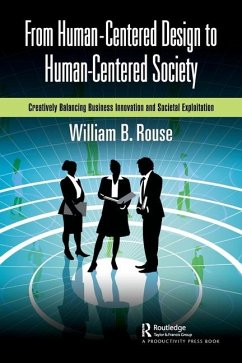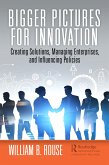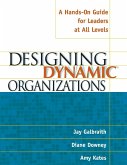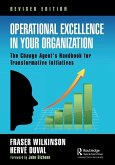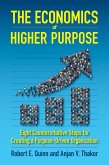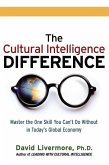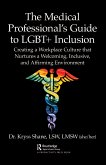William B. Rouse
From Human-Centered Design to Human-Centered Society
Creatively Balancing Business Innovation and Societal Exploitation
William B. Rouse
From Human-Centered Design to Human-Centered Society
Creatively Balancing Business Innovation and Societal Exploitation
- Broschiertes Buch
- Merkliste
- Auf die Merkliste
- Bewerten Bewerten
- Teilen
- Produkt teilen
- Produkterinnerung
- Produkterinnerung
This book addresses the inherent tension underlying the pursuit of this balance. It has played a central role in society at least since the Industrial Revolution (1760-1840). Thus, the story of this tension, how it regularly emerges, and how it is repeatedly resolved, for better or worse, is almost a couple of centuries old.
Andere Kunden interessierten sich auch für
![Bigger Pictures for Innovation Bigger Pictures for Innovation]() William B. RouseBigger Pictures for Innovation32,99 €
William B. RouseBigger Pictures for Innovation32,99 €![Designing Dynamic Organizations Designing Dynamic Organizations]() Jay GalbraithDesigning Dynamic Organizations29,99 €
Jay GalbraithDesigning Dynamic Organizations29,99 €![Operational Excellence in Your Organization Operational Excellence in Your Organization]() Fraser WilkinsonOperational Excellence in Your Organization38,99 €
Fraser WilkinsonOperational Excellence in Your Organization38,99 €![The Economics of Higher Purpose: Eight Counterintuitive Steps for Creating a Purpose-Driven Organization The Economics of Higher Purpose: Eight Counterintuitive Steps for Creating a Purpose-Driven Organization]() Robert E. QuinnThe Economics of Higher Purpose: Eight Counterintuitive Steps for Creating a Purpose-Driven Organization25,99 €
Robert E. QuinnThe Economics of Higher Purpose: Eight Counterintuitive Steps for Creating a Purpose-Driven Organization25,99 €![The Cultural Intelligence Difference The Cultural Intelligence Difference]() David LivermoreThe Cultural Intelligence Difference18,99 €
David LivermoreThe Cultural Intelligence Difference18,99 €![Ways of Greening Ways of Greening]() Stevie FamulariWays of Greening77,99 €
Stevie FamulariWays of Greening77,99 €![The Medical Professional's Guide to LGBT+ Inclusion The Medical Professional's Guide to LGBT+ Inclusion]() Kryss ShaneThe Medical Professional's Guide to LGBT+ Inclusion38,99 €
Kryss ShaneThe Medical Professional's Guide to LGBT+ Inclusion38,99 €-
-
-
This book addresses the inherent tension underlying the pursuit of this balance. It has played a central role in society at least since the Industrial Revolution (1760-1840). Thus, the story of this tension, how it regularly emerges, and how it is repeatedly resolved, for better or worse, is almost a couple of centuries old.
Hinweis: Dieser Artikel kann nur an eine deutsche Lieferadresse ausgeliefert werden.
Hinweis: Dieser Artikel kann nur an eine deutsche Lieferadresse ausgeliefert werden.
Produktdetails
- Produktdetails
- Verlag: Taylor & Francis Ltd
- Seitenzahl: 208
- Erscheinungstermin: 31. Januar 2024
- Englisch
- Abmessung: 229mm x 152mm x 11mm
- Gewicht: 308g
- ISBN-13: 9781032611730
- ISBN-10: 1032611731
- Artikelnr.: 69432456
- Herstellerkennzeichnung
- Libri GmbH
- Europaallee 1
- 36244 Bad Hersfeld
- gpsr@libri.de
- Verlag: Taylor & Francis Ltd
- Seitenzahl: 208
- Erscheinungstermin: 31. Januar 2024
- Englisch
- Abmessung: 229mm x 152mm x 11mm
- Gewicht: 308g
- ISBN-13: 9781032611730
- ISBN-10: 1032611731
- Artikelnr.: 69432456
- Herstellerkennzeichnung
- Libri GmbH
- Europaallee 1
- 36244 Bad Hersfeld
- gpsr@libri.de
William B. Rouse is a Research Professor in the McCourt School of Public Policy at Georgetown University, as well as a Senior Fellow in the office of the Senior Vice President for Research, Professor Emeritus, and former Chair of the School of Industrial and Systems Engineering at the Georgia Institute of Technology, and Principal at Curis Meditor, a firm focused on the health of people, processes, organizations, and society. His research focuses on understanding and managing complex public-private systems such as healthcare delivery, higher education, transportation, and national security, with emphasis on the mathematical and computational modeling of these systems for the purpose of policy design and analysis. Rouse has written hundreds of articles and book chapters, and has authored many books, including most recently Transforming Public-Private Ecosystems (Oxford, 2022), Failure Management (Oxford, 2021), Computing Possible Futures (Oxford, 2019), Universities as Complex Enterprises (Wiley, 2016), Modeling and Visualization of Complex Systems and Enterprises (Wiley, 2015), Understanding and Managing the Complexity of Healthcare (MIT Press, 2014), Economic Systems Analysis and Assessment (Wiley, 2011), People and Organizations: Explorations of Human-Centered Design (Wiley, 2007), Essential Challenges of Strategic Management (Wiley, 2001) and the award-winning Don't Jump to Solutions (Jossey-Bass, 1998). He has edited or co-edited numerous books including Perspectives on Complex Global Challenges (Wiley, 2016), Engineering the System of Healthcare Delivery (IOS Press, 2010), The Economics of Human Systems Integration (Wiley, 2010), Enterprise Transformation: Understanding and Enabling Fundamental Change (Wiley, 2006), Organizational Simulation: From Modeling & Simulation to Games & Entertainment (Wiley, 2005), the best-selling Handbook of Systems Engineering and Management (Wiley, 1999, 2009), and the eight-volume series Human/Technology Interaction in Complex Systems (Elsevier). Among many advisory roles, he has served as Chair of the Committee on Human Factors (now Board on Human Systems Integration) of the National Academies, a member of the advisory committee for the Division of Behavioral and Social Sciences and Education of the National Academies, a member of the U.S. Air Force Scientific Advisory Board, and a member of the DoD Senior Advisory Group on Modeling and Simulation. He has been designated a lifetime National Associate of the National Research Council and National Academies. Rouse is a member of the National Academy of Engineering and has been elected a fellow of four professional societies -- Institute of Electrical and Electronics Engineers (IEEE), the International Council on Systems Engineering (INCOSE), the Institute for Operations Research and Management Science (INFORMS), and the Human Factors and Ergonomics Society (HFES). Rouse received his B.S. from the University of Rhode Island, and his S.M. and Ph.D. from the Massachusetts Institute of Technology.
Chapter 1. A Central Tension Chapter 2. Innovators & Exploiters Chapter 3.
Transportation & Defense Chapter 4: Computers & Communications Chapter 5:
Internet & Social Media Chapter 6: Health & Wellness Chapter 7: Energy &
Climate Chapter 8: Creating the Balance
Transportation & Defense Chapter 4: Computers & Communications Chapter 5:
Internet & Social Media Chapter 6: Health & Wellness Chapter 7: Energy &
Climate Chapter 8: Creating the Balance
Chapter 1. A Central Tension Chapter 2. Innovators & Exploiters Chapter 3.
Transportation & Defense Chapter 4: Computers & Communications Chapter 5:
Internet & Social Media Chapter 6: Health & Wellness Chapter 7: Energy &
Climate Chapter 8: Creating the Balance
Transportation & Defense Chapter 4: Computers & Communications Chapter 5:
Internet & Social Media Chapter 6: Health & Wellness Chapter 7: Energy &
Climate Chapter 8: Creating the Balance

